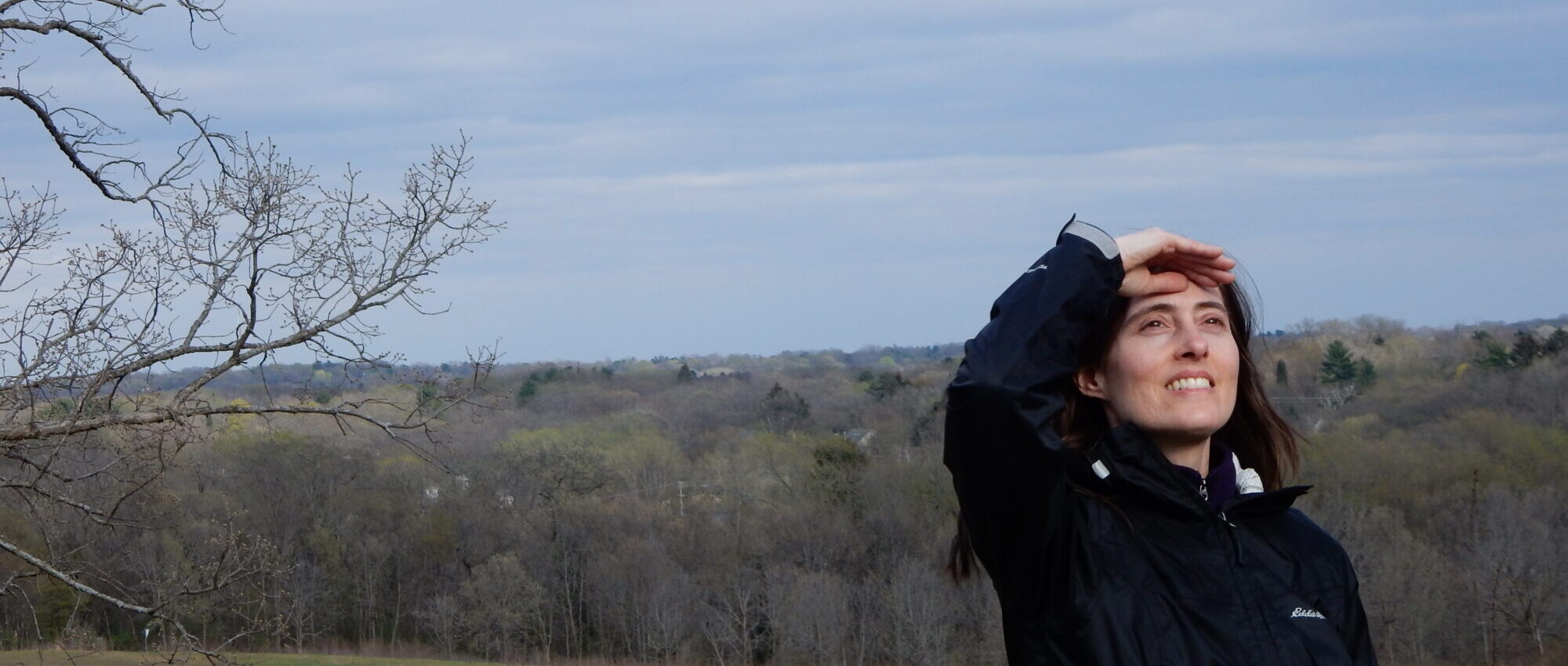When I began meditating years ago, I practically rolled my eyes at the first instruction, “Stay with your breath.” I was in a musty living room on Madison’s near west side, and could’ve stayed home to feel air entering my nostrils.
I’m not sure what I’d expected. Grander instruction, air less musty, so I could experience a requisite buzz or hum that beckoned me closer to enlightenment, reassuring me of the peace that awaited me in due time? Instead, I felt embarrassment. I couldn’t stay with my breath more than a second or two.
That was the first of many lessons I received, a lesson less about breath watching than being okay with things as they are–including embarrassment. Eventually I realized that if I can actually attain “being okay with embarrassment,” I’m actually doing pretty darn well. Yay?
When we enter into something new—whether meditation, writing, or video editing for our account on Twitter—it’s common to look ahead to the grand end result we desire, idealize it, and overlook all the steps and stumbles in between. Our minds fast-forward to nirvana levels of happiness, Academy Award winning cinematography, or the legendary stream-of-consciousness purity of On the Road.
Okay, most of us know there will be additional steps between now and enlightened mastery. But those finish lines we strive for? That end product seems so effortless. How hard could it be to get there?
Turns out, it’s pretty hard—or we perceive it to be—because there’s a gap between where we are now, and where we want to be. The hardest part, for most of us, is bridging that gap—and that means repeated effort. Practicing. And practicing without the thrum of enlightenment coursing through our veins every second. It even means realizing, on days we have a few blissful achievements, that the bridge may not be taking us where we expect. It may be hard to know where the “there” we’re supposed to get to is, exactly.
We may experience this as a crisis of faith. Especially because, by then, the thing we were excited about when we started isn’t new anymore. It’s gotten kind of old.
But that’s just another stumble on the path. And there’s way out of that crisis of faith.
Look not to the finish line, but the small steps you’re taking in your practice. Now look closer. Is the process really getting old?
Actually, if you attend carefully as you enter whatever inlet helps you connect to your work, you will find a new eddy, discover a different pull in the current, each time. Like the current in a stream you can never step into twice. But it helps to keep the flow going.
Whether we’re writers returning to a draft, starting a revision, beginning a new piece because we’re tossing yesterday’s attempt, or tweaking that attempt to make it better today, good rewriting isn’t rehashing. It’s just another beginning.
Today I posted a quote from the prolific writer James Michener on Facebook that says as much: “Real writing begins with rewriting.” There it begins.
In mindfulness meditation, the goal isn’t to feel the thrum of peace while counting blissful breaths, but to be present when peace isn’t present. Or heck, maybe it is. Until it isn’t. And be with what happens after you’ve been distracted—yanked into resentment or sleepiness or grocery lists—then yanked back to reconnect. Right now.
It requires faith in the process and yourself. And as you ring in the new this year, and write in the New Year, trust you can find the old in the new, the new in the old—returning, recovering, letting go of old patterns that are no longer useful, or being with them in a new way.
And with each rewriting, begin again.



Your comments about feeling the pull of a new eddy when revisiting earlier written versions is true. My eye or understanding of the content pulls me in a new way to write/revise.
Indeed! And that understanding can deepen and grow stronger the more we feel those pulls. It renews. And we can use the pull of current to help us let go of what’s unneeded, while also re-entering the flow and momentum of what we started–and what matters most.
“Real writing begins with rewriting.” Absolutely true! It’s the process of revisions where I really dig my heels in and get to work. I also appreciate the sentiment about finding new in the old. There is so much excitement when a new story comes to life, but when you edit the pages over and over again, perfecting them, that excitement dissipates. Thanks for the reminder Angela that we have the ability to bring novelty to the writing process.
Happy New Year!
Happy New Year, Michelle! Your choice of the word “novelty” is so perfect for novel revision. We can bring novelty to writing the novel, even when rewriting it. Though it doesn’t feel new anymore, rewriting provides its own rich rewards–different than the trailblazing of that first pass. The rewards are new in their own way: rewards of patience, curiosity, increased attention. Of focused mining rather than bright blasting. And the more you rewrite the more you can appreciate how a story’s development strengthens and plot thickens.
This post gives me hope that you’ll understand my plot!
A plot about Buddhism’s transformative healing powers? I’m on board! 🙂